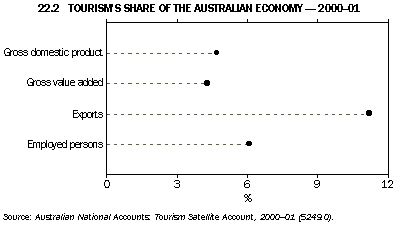Tourism is important to the Australian economy, underpinning a wide range of industries. The Tourism Satellite Account (TSA) reported that more than $70b worth of tourism goods and services were consumed in 2000-01. A TSA has been recognised internationally as the best method for measuring the economic contribution of tourism and as an important information base for the calculation of its economic effects.
Tourism is not a conventional industry in the System of National Accounts. It is defined by the customer (visitor) rather than the goods and services produced. For example, consumption of a restaurant meal by a visitor is defined as 'tourism'. When the meal is consumed by a resident, the consumption is not 'tourism'. The TSA creates a broad picture of tourism which allows it to be compared to conventional industries like agriculture, manufacturing and retail trade.
The estimates of tourism gross value added relate to the direct impact of tourism activity. This means that only the value added where there is a direct economic or physical relationship between the visitor and the producer of a good or service is included. Similarly, the employment estimates only include employment generated where visitors have a direct relationship with the producer of the good or service.
The indirect effects of tourism consumption are measured in Research Paper No. 6: Tourism's Indirect Economic Effects 1997-98 (Bureau of Tourism Research 2001).
Tourism gross value added
Gross value added is the preferred national accounts measure of industry production as it excludes taxes and subsidies on products. In 2000-01, tourism gross value added was $26.3b, contributing 4.3% to total industry gross value added (graph 22.2). The industries which accounted for the largest shares of tourism gross value added were: air and water transport (15%); accommodation (11%); cafes, restaurants and takeaway food outlets (9%); and the other retail trade industry (9%). The remaining share was distributed widely among other industries.

 Print Page
Print Page